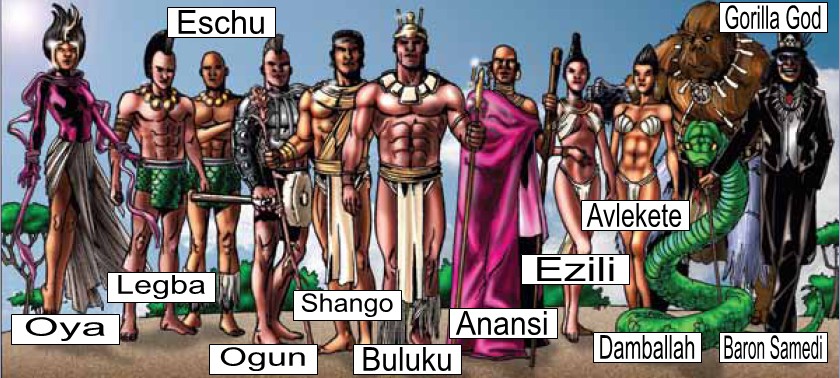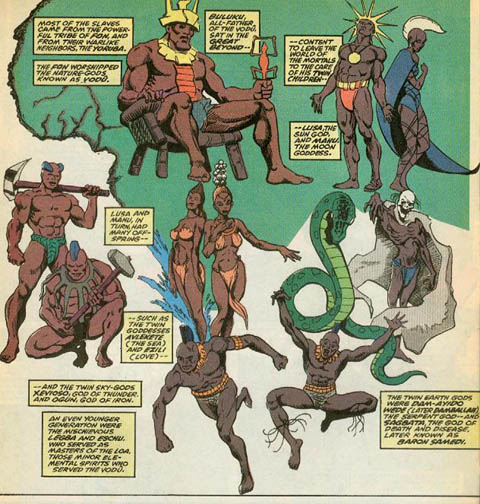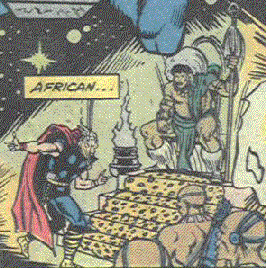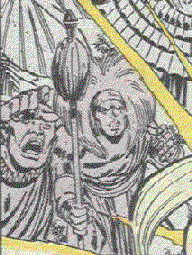
AFRICAN GODS

Classification: Gods (Extra-Dimensionals/Immortals)
Location/Base of Operations: Orun, the Great Beyond
Known Members: Anansi (god of wisdom & trickery),
Avlekete (goddess of the sea), Buluku
(god of the sky), Dam-Ayido (aka Damballah, god of serpents), Eleggua (aka Eschu, god of crossroads
& communication), Ezili (aka Oshun, goddess of love),
Gorilla God/Ghekre (god of judgment), Kibuka, Legba(god of gateways), Lusa, Mahu,
Moondog, Nana (Gaea),
Ogun (god of war),
Oya (goddess of wind), Sagbata (aka Baron Samedi, god of death &
disease), Shango (aka Xevioso, god of thunder & lightning)
Affiliations: Thor and the Asgardians; Other races of
Gods
Aliases: Orishas, Sky Gods
First Appearance: Dracula Lives#2 (August, 1973)
Powers/Abilities: The Vodū all possess certain superhuman physical attributes.
They are true immortals who cease to age upon reaching adulthood,
and they cannot die by conventional means. The Vodū are immune to
all terrestrial diseases and are resistant to conventional injury. If a Vodū
is wounded, his or her godly life force will enable him or her to recover
at a superhuman rate. It would take an injury of such magnitude that
it incinerates a Vodū or disperses a major portion of his or her bodily
molecules to cause him or her to die. Even then, it may be possible for a
god of greater or equal power, or several gods acting together, to revive
the deceased god before the god's life essence is beyond resurrection.
Vodū flesh and bone are about two-and-a-half times denser than
similar human tissue, contributing to the gods' superhuman strength
and weight. An average male god can lift about 25 tons; an average
goddess can lift about 20 tons. The gods' metabolism gives them
superhuman endurance in all physical activities. Many Vodū also
possess additional superhuman powers. For instance, Eleggua, the
god of communication, understands all languages and can cause
acute confusion in and alter the communication abilities of others. In
addition, the Vodū are served by the loa, lesser elemental spirits who
possess more limited, specialized gifts that personify forces of nature.
In rare instances, mortals may ascend to loa status after death if they
were honored in life. The twins Legba and Eschu, two of the Vodū
pantheon's younger members, supervise the loa and are often the first
Vodū invoked by humans when they wish to call upon the loa or
other Vodū for assistance.
History: (Thor & Hercules: Encyclopedia Mythologica) - The Vodū (also known as the "Orishas" or West
African gods) are a race of superhumanly powerful humanoid
beings first worshipped by the Fon people of Dahomey (in the
modern-day nation of Benin) and the Yoruba people of the
Niger River valley (in the modern-day nation of Nigeria) as early
as the 12th century. Most of the Vodū dwell in the Orun, the
Great Beyond, a small "pocket" dimension adjacent to Earth;
several interdimensional nexuses between Orun and Earth
exist throughout the African continent, including one near the
ancient Yoruban city of Ife (located in modern-day Osun State,
Nigeria). Very little is known about Orun other than it appears
to be built upon a small planetary object. The Vodū are called
different names by their human worshippers; for example, the
Vodū Sky Father Buluku is known as "Olorun" by the Yorubans,
as "Nyame" by the Ashanti, as "Ndriananahary" to the Malagasyspeaking
people of Madagascar, and as "Olodumare" by
practitioners of Cuban Santeria. To the Baganda of the African
Great Lakes region, Buluku was known as "Mukasa" and sired
their war god, Kibuka. To the Baoulé of West Africa, he was
known as "Alouroua" and fathered Ghekre, who would later be
worshipped as the "Gorilla God" by the White Gorilla Cult of
Wakanda's Jabari tribe.
In recent centuries, the Vodū's mortal followers incorporated
aspects of Christianity into their worship of Buluku and his
offspring. Today, these worshippers are concentrated in Western
Africa, the Caribbean (particularly Haiti and Cuba), and Central
America. Through ritualistic propitiation and invocations
directed toward a particular Vodū or loa, mortals can tap their
patron god's power. Sometimes, the Vodū even go as far as
possessing mortals who invoke their names, temporarily taking
over the mortal worshipper's conscious personality. The Vodū's precise origin, like that of all Earth's pantheons, is
shrouded in legend. According to ancient myths, Buluku, the
supreme all-father of the Vodū, merged with the primordial
Earth Mother Gaea (later known among the Vodū alternatively
as "Nana," "Ale," and "Asase Ya"), and sired twin offspring: The
sun god Lusa and the moon goddess Mahu. As a result of this
merging, the "supreme creator" was sometimes worshipped by
mortals as the androgynous "Nana Buluku." Vodū worshippers
believe that Lusa and Mahu joined forces to create the mortal
world, mortal life, and mortal technology in four days' time.
Buluku remained in Orun, content to leave this newborn mortal
world's care to his children. Lusa and Mahu, in turn, sired several
divine pairs of twins, including Avlekete and Ezili, Ogun and
Shango, Dam-Ayido Wede and Sagbata, and Eschu and Legba.
Lusa, Mahu, and their family became directly active in mortal
affairs and descended to the ancient city of Ife, the legendary
first city of the Yoruba people. Eventually, their twins, who each
possessed a unique aspect of Buluku's omnipotence, strayed
from Ife and settled in other mortal cities in Western Africa.
(Thor I#300 (fb))- Centuries ago, Buluku,
the leader of the African Gods attended a council of Godheads in which they
agreed not to interfere with the activities of the Celestials. (Thor & Hercules: Encyclopedia Mythologica) - When many of their worshippers were forcibly relocated to
the Caribbean islands as slaves in the 16th century AD, Dam-
Ayido Wede, the Vodūn god of serpents, followed the slave ships
across the Atlantic Ocean and brought Vodū worship to the New
World. (Doctor Strange III#17/2, 20/2)- The connection
of the African gods to Voodoo was revealed from the Book of the Vishanti, as the creation
of the first Brother Voodoo was depicted when Sagbata allied with Chthon to create zombies.
(Thor I#301)- Thor visited Ala, where he successfully petitioned
Buluku for a portion of the
life energies to revive the Asgardians, slain in battle with the Celestials.
(Thor Annual#10) - Shango helped Thor defeat the entity
Demogorge. Briefly consumed by the creature, he was freed when it rejected Thor.
(Thor I#398) - Two African Gods, Buluku and another, possibly Nyambe and Anansi,
sensed the Enchantress' grief as she raged over the apparent death of Heimdall.
(Daredevil: Father#1-5) - Cuban-American entertainment entrepreneur
Nestor "NeRo" Rodriguez consulted a Santerian priest ("santero")
and invoked Eschu to empower him so that he could avenge his
father, who had been murdered by the Kingpin (Wilson Fisk)
years earlier. Eschu answered Rodriguez's call and granted him
superhuman abilities. Calling himself "Eleggua" in honor of his
patron deity, Rodriguez used his family's fortune to bankroll the
Santerians, a street-level vigilante team operating out of New
York City and comprised of his childhood friends, who were
similarly empowered by Ezili, Ogun, Oya, and Shango.
Comments: Adapted to the Marvel Universe by Mark Gruenwald,
Ralph Macchio, and Keith Pollard.
Nyambe had more significance over Shango or his father Lusa. My
book on African spirits places a lot of importance on Nyambe as ruler, judge
and Great Spirit. Lusa is mentioned only as the sun-god who fathered the
Great Twins of which Shango and Damballah are two of. In the MU, I would
surmise that Buluku supersedes them both to keep dissension out of the Loa
(Voodoo Gods) and their relations the Orishas (Sky Gods).
In an alternate reality, (Earth-Thor-Thrall of Seth, @ What
If II#38), Buluku met with the godheads to discuss Seth who has conquered
Asgard in this reality.
In the Marvel Universe, the Black Panther and a large portion
of the people of Wakanda worship the Panther God. While
there is no "Panther God" in the African pantheon, Christopher Priest, the
ALWAYS ENTERTAINING writer of the Black Panther, named the Panther God as
Bast. Bast is an Egyptian Cat God, but I see no reason why the worship of
this deity couldn't have migrated South slightly to take hold in Wakanda.
So, we're going with naming Bast as the Panther God, and including him/her
(Androgyny is not that uncommon in mythology) with the Egyptian Gods, for now. With respect to the two mythic Damballahs, Carycomix suggests:
"The one who acted as eponym and power source for Brother Voodoo's first
major bad guy was spawned by the Elder God Set. Set was probably trying to steal
worshipers from the real Damballah, the same way some of his were stolen by
Seth of Heliopolis! According to an issue of 'Nightmask' (one of the Marvel
New Universe books that came out in the 1980's), the real Damballah was seen
by his Afro-Caribbean worshipers as benevolent.", African Gods previously appeared in "Stone God" (Astonishing#11 (September, 1952), 5th story) amp; in "Propaganda" (Journey Into Mystery I#80 (May, 1962), 2nd story) The main image in this profile is by Pablo Raimondi. Profile by
William
Uchtman and
Snood.
CLARIFICATIONS: Damballah a.k.a. Dam-Ayido is not to be confused with: Ogun, the God has no known connection to: Avlekete [center left], goddess of the sea, is the daughter of Lusa and Mahu. She is also wife to the sea-god Olokun. She supported Legba in giving power of the loa to a mortal as a force of good against the evil unleashed by their brother Sagbata.
--Doctor Strange III#17/2 (20/2
Eschu [bottom right], the god of mischief, is the son of Lusa and Mahu. He supported Legba in giving power of the loa to a mortal as a force of good against the evil unleashed by their brother Sagbata
--Doctor Strange III#17/2 (20/2
Ezili [center right], goddess of love and fertility, is the daughter of Lusa and Mahu. She supported Legba in giving power of the loa to a mortal as a force of good against the evil unleashed by their brother Sagbata.
--Doctor Strange III#17/2 (20/2
Legba [bottom left], the god of travelers and messengers, is the son of Lusa and Mahu. He was also master of the loa and his duties involved escorted mortal souls to a peaceful afterlife after physical death. After Sagbata involved Chthon in a spell to create zombies, he joined forces with the other gods of the Vodū to create a force for good against the evil unleashed by his brother. He gave the mortal Laureant power over the loa by means of an ultimate spell he obtained from the earth mother, Gaea. Laureant then became the original Brother Voodoo, the first mortal lord of the loa.
--Doctor Strange III#17/2 (20/2
Lusa [top left], the sun god, is ruler of the Vodū. He is father of the gods Ayaba, Damballah, Eschu, Faa, Gou, Legba, Loco, Maou, Ogun, Sagbata, Shango and Zaca.
--Doctor Strange III#17/2
Mahu [top right], the moon goddess, is wife of Lusa and mother of the gods Ayaba, Damballah, Eschu, Faa, Gou, Legba, Loco, Maou, Ogun, Sagbata, Shango and Zaca.
--Doctor Strange III#17/2
Ogun [middle, near right], the god of iron and artisans, is the son of Lusa and Mahu. He supported Legba in giving power of the loa to a mortal as a force of good against the evil unleashed by their brother Sagbata.
--Doctor Strange III#17/2 (20/2
Sagbata [middle, far right], also known as Baron Samedi, is the god of death and plague. He conspired with the Elder God Chthon to create a spell for the witch doctor, Schango, to create zombies for the pirate Boute-Fe.
--Doctor Strange III#17/2 (20/2
images: Last updated:
06/03/17
Any Additions/Corrections? please
let
me know.
Non-Marvel
Copyright info Special Thanks to www.g-mart.com for hosting the Appendix, Master List, etc.!


Anansi is a spider-god of wisdom who acted as vizier to his father, Nyambe.
`The Lion
God also claims to be one of the African Gods, although
he does not correspond to any previously known mythological character. (Then
again, neither does the Enchantress.) At any rate, the best explanation would
appear to be placing both the Panther and Lion Gods in the Egyptian Pantheon,
as Bast and Sekhmet. I doubt any other clarification is
forthcoming
--Snood.
To which Snood replies: "It's name was Damballah at least as far back as 10000 BC, which is earlier than I might expect the African Gods to have been around. Perhaps the African Damballah stole the Set-spawn's thunder, much the way Seth did to Set."
Carycomix replies that "If so, then Set's kid may have had another name. Perhaps, the Stygian equivalent of Apophis? According to the STARGATE: SG-1 website, the symbol for the actual Apophis of Egyptian mythology was a snake!"
--Gammatotem
Baron Samedi, aka Sagbata, the god, is the patron, or at least
the role model for:
-----Damballah, the enemy of Brother Voodoo, @
Strange Tales I#169
(and the first two Black Talons as well--first invoked
by Black Talon I in Avengers I#152)
Thor & Hercules: Encyclopedia Mythologica, p59
All characters mentioned or pictured are ™ and ©
1941-2099 Marvel Characters, Inc. All Rights Reserved. If you like this stuff,
you should check out the real thing!
Please visit The Marvel Official Site at:
http://www.marvel.com